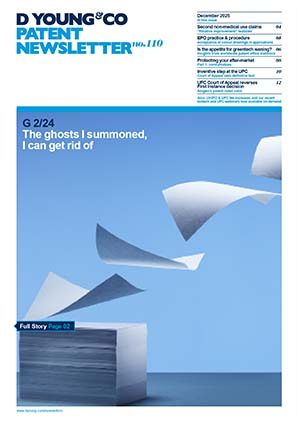EPO Guidelines for Examination: changes from 01 March 2023
The latest update to the European Patent Office (EPO) Guidelines for Examination came into force on 01 March 2023. We discuss some of the more substantive changes below.
Changes Relating to Rules 56 and 56a
Several of the changes to the Guidelines for Examination reflect the addition, in November 2022, of new Rule 56a, and the consequential amendments that were made to Rule 56.
Rule 56 previously provided a mechanism for filing missing parts of an application after the filing date, but did not provide any mechanism for replacing erroneously filed parts of an application. New Rule 56a (and the amendments made to Rule 56) rectify this, by providing provisions for the filing of replacement parts of an application.
As a consequence of this change to the Implementing Regulations, several sections of the EPO Guidelines for Examination have been amended, and a new section (Part A, II, 6) dedicated to new Rule 56a has been added.
For further details on this new rule please refer to our article “Rule 56a EPC: correction of erroneously filed parts of a patent application”, published 27 June 2022.
Read moreSummons to oral proceedings as a first action in examination
The Guidelines for Examination have also been updated to provide some additional guidance regarding the situations in which it might be permissible for the EPO to issue a summons to oral proceedings as a first action in examination proceedings. In particular, Part C, III, 5 of the Guidelines for Examination have been updated to set out some situations in which, in examination of a divisional application, a summons to oral proceedings may be issued as a first action.
In general, it appears that the first action in examination of a divisional application is more likely to be a summons to oral proceedings if the claims are substantially the same as or broader than the parent, the parent was refused or withdrawn, and objections raised against either the parent application or against the divisional application (in the search opinion) still apply.
Of note, this section of the Guidelines for Examination still stresses that issuing a summons to oral proceedings as a first action should still be an exceptional occurrence.
UP & UPC
There have also been a number of changes made to the Guidelines for Examination to reflect the entry into force, after the sunrise period, of the unitary patent (UP) and the Unified Patent Court (UPC). Most of these changes are largely cosmetic (adding references to the UP and/or UPC where appropriate).
However, a more substantive change reflects the introduction of “top-up” searches for national prior rights.
In 2022 the EPO started performing top-up searches for national prior rights, in anticipation of the introduction of the UP. A national prior right is a patent or patent application filed in a European Patent Convention (EPC) state, which is not citeable against the European patent application but may be citeable against the unitary patent or a European patent application validated in that EPC state. These top-up searches, which are provided free-of-charge by the EPO, may therefore be useful to applicants, whether or not they plan to request unitary effect.
For further details on the introduction of the EPO’s top-up searches for national prior rights please refer to our article “EPO searching national prior rights to assist applicants for the unitary patent”, published 07 November 2022.
Read moreThere are also several articles and webinars on the D Young & Co website, if you would like to know more about the UP and the UPC.
Read moreA full list of the changes made to the Guidelines for Examination in this latest revision is provided on the EPO website.
Useful links
- “Rule 56a EPC - correction of erroneously filed parts of a patent application” published 27 June 2022: dycip.com/epcrule56a.
- “EPO searching national prior rights to assist applicants for the unitary patent” published 07 November 2022: dycip.com/prior-right-search.
- EPO Guidelines for Examination: dycip.com/guidelines-examination.

